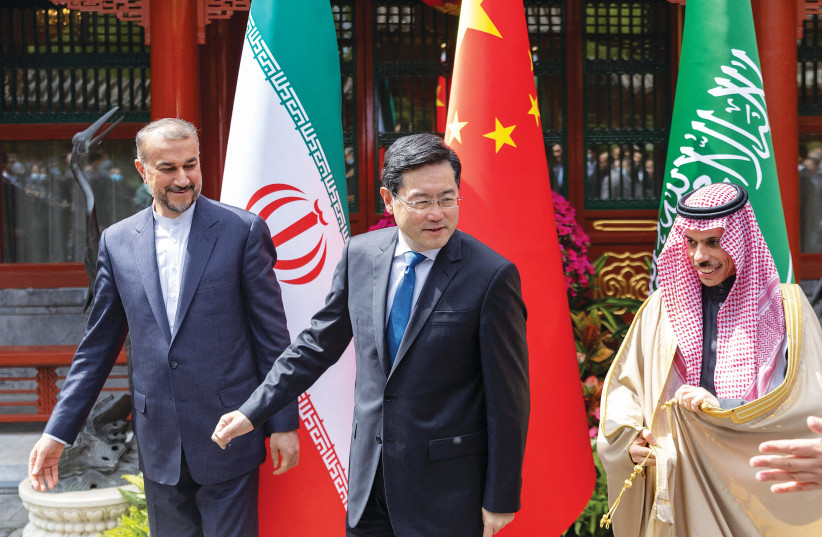On July 12, 2023, Israel’s national anthem, “Hatikvah,” played in the video game version of the FIFA World Cup for the first time in Saudi Arabia.
In contrast, a month earlier in Tehran, in an unconventional diplomatic protocol the Iranian Foreign Affairs Ministry hung a photo of the assassinated Iranian military hero – once a threat to the Saudis – Qassem Soleimani in the conference room of the Foreign Affairs Ministry of the Islamic Republic, during the first visit of Saudi Arabia’s foreign minister – after seven years of tension between Iran and Saudi Arabia.
In response, the Saudi Arabian delegation refused to proceed to the room. A change of venue was arranged for the joint press conference between Iranian Foreign Minister Hossein Amir-Abdollahian and his Saudi counterpart Prince Faisal bin Farhan
This year, Iran and Saudi Arabia signed an agreement mediated by China, supposedly ending the conflict between the Islamic rivals in the Muslim world after seven years of altercation. However, many indications suggest that this treaty is a shaky accord and that their conflict is ongoing.
Amid this unstable alliance between the two, Israel has an opportunity to continue expanding the Abraham Accords and sign an agreement with Saudi Arabia.

Why the Iran-Saudi Arabia alliance is shaky and unstable
The treaty between Iran and Saudi Arabia is shaky due to historical tension, the regional security dilemma between Iran and Saudi Arabia, and the concerns of Iran’s allies. Although the peace accord is welcomed by various countries in the region and by Iran’s internal parties, both sides are concerned for their own interests. As a Shia-dominated state, Iran has been supporting the Shia forces in the Middle East. Conversely, Saudi Arabia, as a Sunni kingdom, has been active in a counter-influence campaign since Iran’s Islamic Revolution in 1979.
Historically, Iranian public opinion is against the Islamic caliphate, which imposed the first era of Islam on Iran, and Iranians consider that Islamic Arab Bedouin toppled the symbol of their civilization, the Sasanian Empire, in 651 CE. They have always claimed that the Arab offensive attack and the collapse of the Persian Empire was a turning point in Persian civilization. The significant book of Persian mythology, Shahnameh: The Epic of the Persian Kings, has many verses promoting hatred of Arabs.
Additionally, Beeta Baghoolizadeh and Alex Shams argue that “Iran’s cultural encounters with the Arab World and Turkic peoples have been confrontational and highly detrimental to the supposed ‘cultural purity’ of the Iranian peoples.” Furthermore, these Iranian historians add that “The Shahnameh is essentially a secular text and indirectly or directly opposes Islam, Islamic societies, and Arabs.”
Shahnameh and its anti-Arab verses continue to circulate in educational center curricula, and in cafes and tea houses as traditional performances. Thus, most Iranian public opinion is opposed to Saudi Arabia as the perpetrator of the fallen Persian civilization.
In addition, Saudi Arabia’s security concerns about Iran remain.
Mohammad Amin Nouri, director general of The Regional Studies Scientific Association of the University of Tehran, concluded in an article that the treaty between the kingdom and Iran is unstable for many reasons. Another Iranian scholar tweeted that the kingdom is seeking a security guarantee as a pre-condition to joining the Abraham Accords. Rahman Gharemanpour added that if Saudi Arabia is looking for a security guarantee, that is because the kingdom still feels threatened by Iran. Thus, Saudi Arabia seeks a guarantee to counter any possible threat from Iran.
BESIDES THE regional security dilemma between Saudi Arabia and Iran, third parties such as the members of the Houthis group, Ansar Allah, are affected by this agreement and feel disgruntled. Iran had backed the Houthis during a conflict with Saudi Arabia and then utilized them as a wild card during the war. Despite the initial rapprochement, Iran finally abandoned its Zaidi Shia ally. The example of Iran abandoning its allies, which the Houthis experienced, leaves Iran’s partners feeling insecure.
This type of Iranian behavior could spread a message among allies that Iran leaves its allies behind in times of crisis. It is hard to believe that Iran would burn its wild cards, and it is more than likely that Iran will change course and support its allies again. Thus, Iran’s course of action is always to support its allies, which would imply support for the Houthis in Yemen.
Thus, in light of the eventual contentions between Saudi Arabia and Iran, Israel could embrace this significant time as an opportunity to pursue normalization and develop relations with Saudi Arabia.
Israel can start using a soft power approach to normalize its relationship with Saudi Arabia by participating in cultural festivals and sports events. The experience of the Israel Pavilion in Dubai was a positive step, allowing Israel and the United Arab Emirates to exchange common cultural elements and enhance their relations. Saudi Arabia, based on Vision 2030, is investing in a massive cultural festival project in Al-Ula city.
The next step toward normalization and hope will be to hear Israel’s national anthem at the upcoming International Conference on Arts and Cultural Management (ICACM) from November 15-16, in Jeddah – and at other cultural and sports events.
The presence of Israel at these festivals could be a significant step toward normalizing relations with Saudi Arabia, while Iran is absent from these cultural events.
The writer is an expert on Middle Eastern affairs based in Canada, who focuses on the Abraham Accords and Canadian foreign policy.
